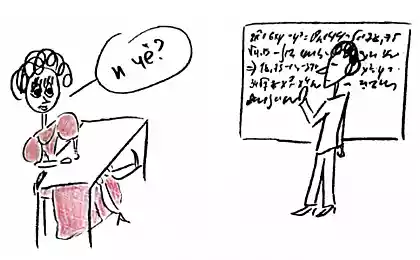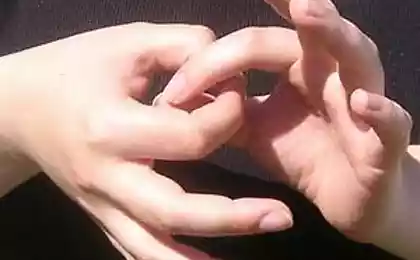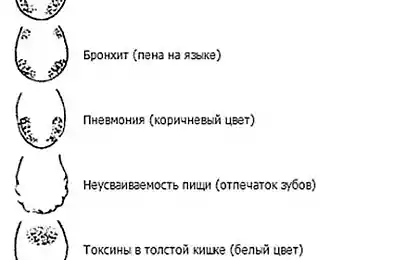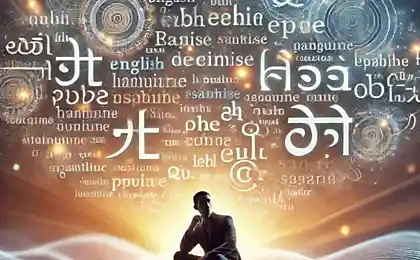1503
Sign language in different countries
"Come here»
Sign beckons index finger, saying, "Come to me," it is a taboo in Asian countries. In the Philippines, this gesture is only relevant in relation to dogs, and suggests that you consider inferior companion. Moreover, the use of such a gesture could lead to the arrest in this country.

"Goat»
"Goat" love rock musicians, metalworkers and their fans. But do not show it in Italy, Spain and Macedonia, especially men, as a gesture hinting at infidelity wife destination ("cuckold"). Among the superstitious people in Western countries, a sign of "goat" means the same thing as we spit over his shoulder, that is the usual protection against the evil eye, witches and various evil forces.

"Likes»
Familiar to us "Like" a gesture of agreement and approval often erases language barriers, and fans often hitchhike on the way they vote.
However, in Thailand, it is a sign of condemnation. Although he soon children like protruding tongue, it should be avoided. In Iran, it is insulting gesture, the equivalent of the middle finger exposed. In some other countries, for example, in Greece this gesture means "shut up».

Gesture "Victory»
Gesture that shows the index and middle finger in the form of a letter V, in many countries means victory or peace. However, if this palm facing to the person in the UK, Ireland and Australia V-shaped gesture becomes offensive gesture, which is a non-verbal equivalent of the phrase "fuck off!».
The fact that the English archers, suggesting awe at enemies in a 100-year Anglo-French war, cut off these two fingers on his right hand, so that they could no longer shoot arrows. And if so Archer pointed fingers intact, it means "fear enemies!". The French perceive this gesture as an insult to their address.

Exposed palm
Outstretched palm, which is requested to stop, or stop in Greece takes on a different meaning. Palms, directed to strontium interlocutor - the so-called "Munz" - used in the case when they want to express our strong indignation and "send" the interlocutor. This gesture was a Byzantine times when the offender's face smeared soot to make fun of him.
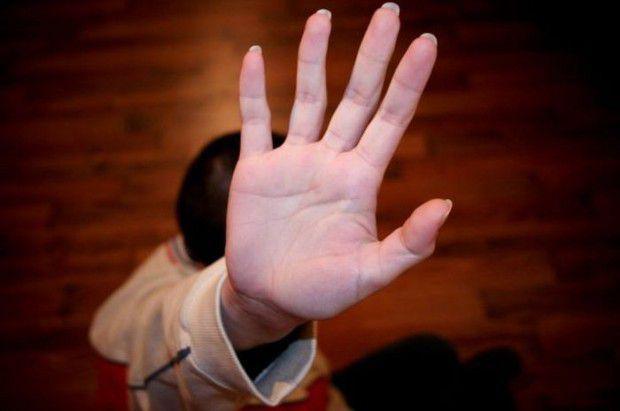
Stroking the head
Stroking the baby's head is usually a gesture of friendship and affection. However, in the Buddhist religion top is the highest point of the body, that is the place where the soul resides. Touching the top - aggressive intrusion into space man. It is necessary to avoid this gesture in countries where most people are Buddhists.

"The Fig»
Gesture "fig", "shish" or "fig" is used in the event of failure or disagreement. In Brazil and Portugal is a benevolent gesture, a way of the wishes of good luck and protection from the evil eye. In Turkey, he has an aggressive and rough character, which is the equivalent of the middle finger. Folded in fig fingers in many countries associated with sex. In Arab countries, the fig is sexual abuse. In France, the figure of the three fingers is the same as that exhibited middle finger.
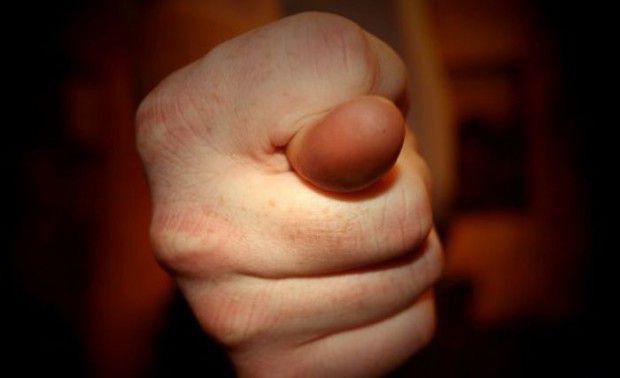
The offer, invitation
In many countries, people do not pay attention to which hand they offer something to other people. However, in India, Sri Lanka, Africa and the Middle East, the left hand is considered "dirty". Even left-hander should have the right hand, as soon as it is considered to be suitable for eating. The same applies to shaking hands and transfer items. But in Japan it is considered to be polite when you give with both hands, while the gesture with one hand may involve neglect.

Crossed fingers
In many Western countries, people cross their index and middle fingers for good luck or the evil eye. In Vietnam, this gesture is considered offensive, especially if you are at the same time looking at the other person. It is thought that crossed fingers are female sex organs.

The middle finger
It is the most famous and recognizable obscene gesture in the world, which shows when they want to send a companion to hell, end the conversation or rude to refuse. In addition, it is one of the most ancient sign, which has been used by the ancient Greeks and Romans, as well as monkeys. In Asian countries, however, sometimes use the middle finger to point at something.

Gesture OK
A ring of thumb and index finger, which means "all right!" Or "OK" in France means "zero" or "worthless." In Greece and Turkey, this gesture is considered a hint of homosexuality. In some Middle Eastern countries, such as Kuwait, he represents the evil eye.
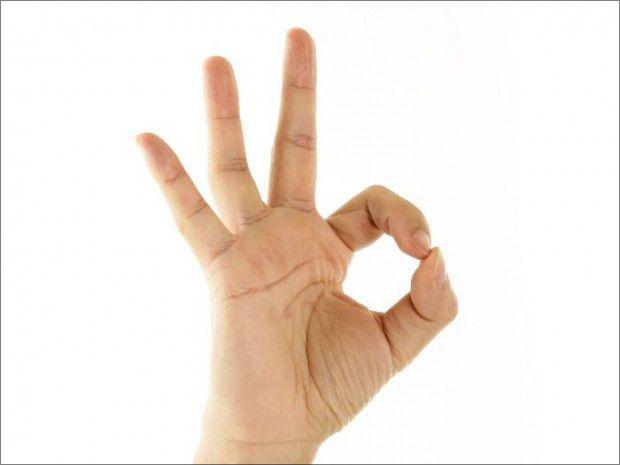
Other gestures in different countries
In Argentina, keep your hands in your pockets is considered improper, in Japan it is not recommended to tighten the belt on public - this means the beginning of hara-kiri. Bulgarians, Greeks and Turks, when they say "Yes", shake your head from side to side, but for us it means "No". Touching your finger to the century in Italy express goodwill in Spain with this gesture express their doubts about the veracity of what has been said, and the Frenchman made it clear the gesture person that he talks too much. When an Englishman wants someone to teach, it raises two fingers put together, while in the US this gesture means a whole team.

Source: www.adme.ru
Sign beckons index finger, saying, "Come to me," it is a taboo in Asian countries. In the Philippines, this gesture is only relevant in relation to dogs, and suggests that you consider inferior companion. Moreover, the use of such a gesture could lead to the arrest in this country.

"Goat»
"Goat" love rock musicians, metalworkers and their fans. But do not show it in Italy, Spain and Macedonia, especially men, as a gesture hinting at infidelity wife destination ("cuckold"). Among the superstitious people in Western countries, a sign of "goat" means the same thing as we spit over his shoulder, that is the usual protection against the evil eye, witches and various evil forces.

"Likes»
Familiar to us "Like" a gesture of agreement and approval often erases language barriers, and fans often hitchhike on the way they vote.
However, in Thailand, it is a sign of condemnation. Although he soon children like protruding tongue, it should be avoided. In Iran, it is insulting gesture, the equivalent of the middle finger exposed. In some other countries, for example, in Greece this gesture means "shut up».

Gesture "Victory»
Gesture that shows the index and middle finger in the form of a letter V, in many countries means victory or peace. However, if this palm facing to the person in the UK, Ireland and Australia V-shaped gesture becomes offensive gesture, which is a non-verbal equivalent of the phrase "fuck off!».
The fact that the English archers, suggesting awe at enemies in a 100-year Anglo-French war, cut off these two fingers on his right hand, so that they could no longer shoot arrows. And if so Archer pointed fingers intact, it means "fear enemies!". The French perceive this gesture as an insult to their address.

Exposed palm
Outstretched palm, which is requested to stop, or stop in Greece takes on a different meaning. Palms, directed to strontium interlocutor - the so-called "Munz" - used in the case when they want to express our strong indignation and "send" the interlocutor. This gesture was a Byzantine times when the offender's face smeared soot to make fun of him.

Stroking the head
Stroking the baby's head is usually a gesture of friendship and affection. However, in the Buddhist religion top is the highest point of the body, that is the place where the soul resides. Touching the top - aggressive intrusion into space man. It is necessary to avoid this gesture in countries where most people are Buddhists.

"The Fig»
Gesture "fig", "shish" or "fig" is used in the event of failure or disagreement. In Brazil and Portugal is a benevolent gesture, a way of the wishes of good luck and protection from the evil eye. In Turkey, he has an aggressive and rough character, which is the equivalent of the middle finger. Folded in fig fingers in many countries associated with sex. In Arab countries, the fig is sexual abuse. In France, the figure of the three fingers is the same as that exhibited middle finger.

The offer, invitation
In many countries, people do not pay attention to which hand they offer something to other people. However, in India, Sri Lanka, Africa and the Middle East, the left hand is considered "dirty". Even left-hander should have the right hand, as soon as it is considered to be suitable for eating. The same applies to shaking hands and transfer items. But in Japan it is considered to be polite when you give with both hands, while the gesture with one hand may involve neglect.

Crossed fingers
In many Western countries, people cross their index and middle fingers for good luck or the evil eye. In Vietnam, this gesture is considered offensive, especially if you are at the same time looking at the other person. It is thought that crossed fingers are female sex organs.

The middle finger
It is the most famous and recognizable obscene gesture in the world, which shows when they want to send a companion to hell, end the conversation or rude to refuse. In addition, it is one of the most ancient sign, which has been used by the ancient Greeks and Romans, as well as monkeys. In Asian countries, however, sometimes use the middle finger to point at something.

Gesture OK
A ring of thumb and index finger, which means "all right!" Or "OK" in France means "zero" or "worthless." In Greece and Turkey, this gesture is considered a hint of homosexuality. In some Middle Eastern countries, such as Kuwait, he represents the evil eye.

Other gestures in different countries
In Argentina, keep your hands in your pockets is considered improper, in Japan it is not recommended to tighten the belt on public - this means the beginning of hara-kiri. Bulgarians, Greeks and Turks, when they say "Yes", shake your head from side to side, but for us it means "No". Touching your finger to the century in Italy express goodwill in Spain with this gesture express their doubts about the veracity of what has been said, and the Frenchman made it clear the gesture person that he talks too much. When an Englishman wants someone to teach, it raises two fingers put together, while in the US this gesture means a whole team.

Source: www.adme.ru

















